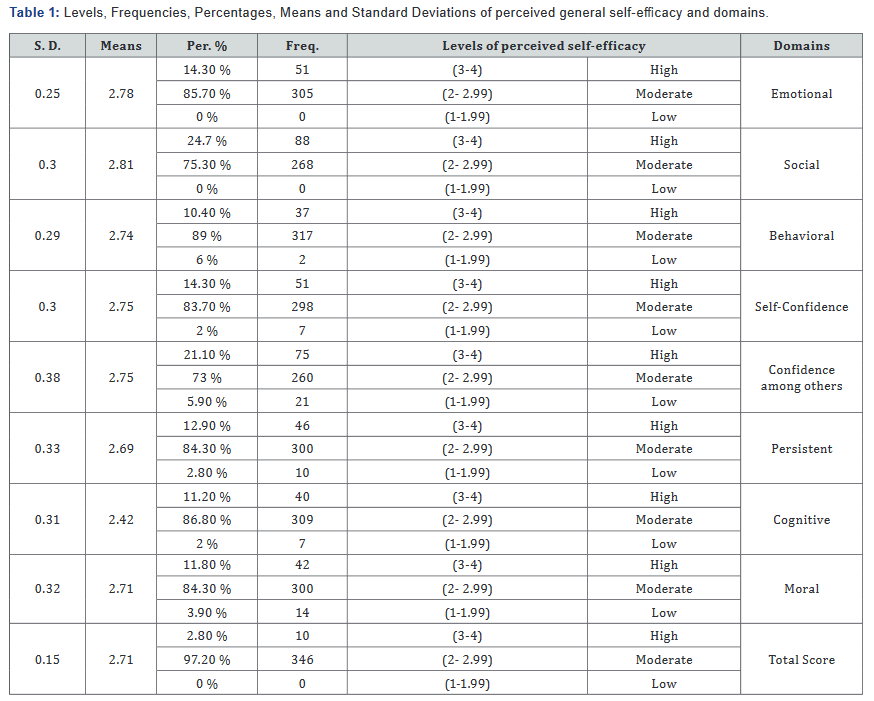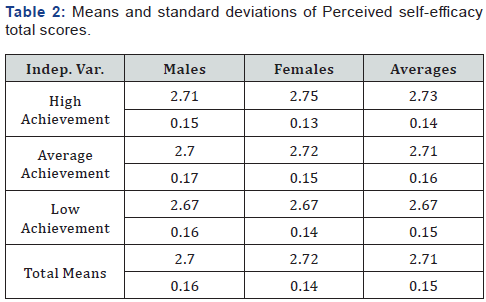Perceived Self-Efficacy and Academic Achievement among Jordanian Students - Juniper publishers
Journal of Trends in Technical and Scientific Research
Abstract
The current study aimed at exploring the relationship
between perceived self-efficacy and academic achievement among a sample
of Jordanian secondary stage students through identifying the levels of
perceived self-efficacy among students and identifying the effect of
gender and academic achievement on self-efficacy. To achieve the study
aims, the researchers applied the perceived self-efficacy scale on (356)
secondary stage students and collected information on students’ gender
and academic achievement. The results of the study showed that the
majority of students hold a moderate level of perceived self-efficacy in
terms of the total score and in all domains scores of the scale. Also,
the results showed a significant effect of academic achievement on
perceived self-efficacy in favor of higher achievement students. In
addition, the results showed no significant effect for gender or the
interaction of academic achievement and gender on perceived
self-efficacy. The results were discussed in terms of developmental and
social aspects of the sample.
Keywords: Self-efficacy, Educators, Positive social interaction, Social reinforcement, Psychological processes
Introduction
Awareness of one’s self dictates behavior, beliefs
about abilities, task achievements and anticipation of success or
failure. Bandura [1] has originally believed that self-efficacy mediate
the relationship between an individual belief in terms of success or
failure and actual behavior when performing a particular task.
Self-efficacy is defined as the beliefs about individuals’ capabilities
to produce designated levels of performance that exercise influence over
events or tasks that affect their lives [2]. Self-efficacy beliefs
determine how someone feels, thinks, and behave. Educators often note
how strong sense of efficacy may affect students’ accomplishment and
personal well-being. Students with high levels of self-efficacy are more
likely to be certain about their capabilities when encountered by
difficult tasks because they see that as a challenge rather than a way
to avoid such difficult situations.
However, perceived self-efficacy can either enhance
students’ capabilities or decrease them. Those who have strong perceived
self-efficacy will be able to analyze their problems and reach better
solutions while those with low perceived self-efficacy will have doubts
about their abilities and avoid initiating successful solutions
especially in difficult situations [3]. This concept implies that
self-efficacy is learned and can develop over age through positive
social interaction and proper social reinforcement [4-5]. Bandura [6]
stated that most of the
research conducted showed that self-beliefs of efficacy affect human
functioning on four major psychological processes. First, most human
behavior is regulated by forethought embodying valued goals because
personal goals are influenced by self-appraisal of capabilities. Second,
self-efficacy plays a major role in the self-regulation of motivation
because most human motivation is cognitively generated and forms beliefs
about what they think they can do. Third, highly perceived
self-efficacy affect people’s beliefs in their coping capabilities and
how much stress or anxiety they experience in threatening or difficult
situations. Finally, highly perceived self-efficacy enables individuals
to create beneficial environments and choose the individuals whom they
can exercise some control during social interaction. Therefore, beliefs
of personal efficacy can shape the course of social interaction and the
types of activities and environments people choose.
Bandura [2] also identified several sources of
self-efficacy. The first and strongest source stems from mastery
experiences since successes build a robust belief in one’s personal
efficacy and failures undermine it. The second source stems from
modeling since seeing people similar to oneself succeed by sustained
effort raises one’s beliefs that one also has similar capabilities and
can succeed; similarly, observing others fail regardless of high effort
lowers one’s judgments of their own efficacy and undermines their
efforts. Social persuasion is a
third source of strengthening people’s beliefs that they have
what it takes to succeed. Students normally will do better
if they are persuaded verbally that they possess certain
capabilities in a particular task and are likely to perform
better than students who have self doubt and focus on their
personal deficiencies when facing a new task. The last source of
successful efficacy comes from individuals’ positive appraisals
and self-improvement because those who have positive selfefficacy
can structure situations that bring success and avoid
placing themselves in situations where they may fail. Schunk
[7,8] found that self-efficacy research is viewed in domains
relevant to education and several studies have addressed
cognitive skills, social skills, motor skills, and career choices
and have shown that self-efficacy is an important construct
that helps to explain students’ learning and performance
of academic achievement. Such studies also have identified
variables that are associated with educational contexts and
that signal to students how well they are achieving or making
progress in learning.
Marat [9] indicated that self-efficacy is viewed as a multidimensional
construct that shares a reciprocal relationship with
various determinants of learning and academic achievement.
These determinants included motivation, strategies, cognitive
strategies, resource management, self-regulated learning,
meeting others’ expectations, and self-assertiveness. Several
studies revealed that students with highly self-efficacy capabilities
showed better abilities in solving difficult tasks, more
initiatives, less risk taking, more persistent, ambition and
more emotional or social stabilities [9-12]. Other studies have
shown a positive relationship between students’ self-efficacy
capabilities and academic achievements among school and university
students; those who have higher perceived self-efficacy
usually have better academic achievement [13-16]. Few studies
showed that there was no significant relationship between
perceived self-efficacy and academic achievement [4,17-19].
The present problem
Students with high self-efficacy capabilities are considered
better in solving problems, work harder on difficult tasks, face
more initiatives, take less risk, and show signs of persistent
emotional and social stabilities. Most of the previous research
has shown that perceived self-efficacy is an important factor
that helps to explain students’ learning and performance of
academic achievement in Western cultures. Furthermore,
academic achievement could be a determinant of self-efficacy,
therefore, the present study aim at exploring the effect of
academic achievement and students’ gender on perceived selfefficacy
among a sample of Jordanian secondary stage students.
Also, the present study will attempt to identify the levels of
perceived self-efficacy among students. In other words, the
present study will answer the following questions:
a. What is the level of perceived self-efficacy among a
sample of Jordanian secondary stage students?
b. What is the effect of academic achievement and
student’s gender on perceived self-efficacy scores among a
sample of Jordanian secondary stage students?”
Significance of the study
The significance of present study stems from the fact that
it explores the relationship between self-efficacy capabilities
and students learning and academic achievement. It brings
more attention to the self-efficacy as a construct which
shares a reciprocal relationship with various determinants of
learning and academic achievement. Regardless of the many
international studies on the topic, the authors have not found
any direct studies on the relationship between perceived selfefficacy
and academic achievement among school students
at the Jordanian or Arabic regional level. Some local studies
have attempted to study the impact of perceived self-efficacy
on various factors such as depression and anxiety [20], moral
development [21], need for achievement and adjustment [22],
and locus of control and adjustment strategies [23]. Therefore,
the present study will explore this relationship among a
Jordanian sample and put some recommendations to teachers
based on the results.
Operational definition of terms
Perceived Self-Efficacy: Students’ estimation of their
expectation towards abilities as measured by the perceived
self-efficacy scale.
Academic Achievement: Students’ CGPA at the End of the
previous year based on school records.
Method
Population and sample
The population consisted of all secondary stage students
enrolling in the 1st Irbid directorates of education in Jordan
that were estimated at 7968 students (4090 males and 3878
females). The sample consisted of 356 students (210 males
and 155 females) and was chosen randomly using sections in
various schools as a unit of assignment.
Study instrument
To achieve the present study goals, the researchers adopted
A Jordanian version of Perceived Self-Efficacy Scale developed
by Al-Saqer in 2005 [21]. The scale consisted of 70 items
distributed among nine domains (emotional, social, behavioral,
self-confidence, confidence among others, persistent, cognitive,
academic, and moral). Students rated each item using a 4-point
Likert type scale ranging from 4-1 where (4) represents a high
perceived self-efficacy and (1) represents a low perceived selfefficacy.
Validity of the scale: The original Jordanian scale was
validated through construct and
content validity procedures. To re-ensure the validity
of scale, the researchers presented the original scales to 10
psychologists in Jordan. Proper changes were made to ensure
good content validity based on agreements of 80% of judges.
Reliability of the scale: The original Jordanian scale was
tested to be reliable through testretest
method. However, the present researchers have
ensured more reliability measures by distributing the scale
to an independent sample of students (35 students) from the
same population. Alpha score was (.91) for the whole scale, and
scores ranged from .82 to .90 to all nine domains of the scale.
Study procedures
the sample in groups, where each section chosen was treated
as a group and each group ranged from 25-30 students. The
researcher explained the purpose of the study and gave
them instructions in how to rate each item in the scale. The
researcher also gave one example on the blackboard in order
to help the students understand their task. The researcher
answered any questions raised by the students and collected
the scales from the students allowing an average of 35 minutes
to complete the task. Students General CGPA for the year 2007-
2008 was collected from school records. Gender of the students
was decided in advance since all schools used were not mixed
gender schools.
Results
The results of this study are presented according to the
study questions.
First
To answer the first question regarding “What is the level of
perceived self-efficacy among a sample of Jordanian secondary
stage students?”, frequencies, percentages, means, and
standard deviations for students’ ratings on the perceived selfefficacy
scale are shown in (Table 1). Table 1 shows an overall
mean of (2.71) and means for scale domains ranged from (2.42)
to (2.81), which suggests a moderate level of perceived selfefficacy
among the sample for the total score and among all
domains of the scale. Frequencies and percentages showed that
(346) out (356), with a percentage of (97.2%), have scores on
the total sore of the perceived self-efficacy scale in the moderate
level. Percentages of the moderate levels for all domains scores
of perceived self-efficacy scale ranged from (73-89%). Results
also showed that the highest scores on perceived self-efficacy
came from the social domain with a means of (2.81) and least
scores came from the cognitive domain with a means of (2.42).

Second
To answer the second question regarding “What is the effect
of academic achievement and student’s gender on perceived
self-efficacy scores among a sample of Jordanian secondary
stage students?”, means and standard deviations for total
scores of perceived self-efficacy scale based on achievement
and gender were observed as in (Table 2). The results in
Table 2 showed that females means (2.72) were slightly
higher on perceived self-efficacy than males (2.70), and high
achievement students (2.73) have higher means than average
achievement students (2.71) and low achievement students
(2.67). Two-way analysis of variance (ANOVA) was used to test
for statistical significant differences in perceived self-efficacy
due to variation in academic achievement levels and students
gender as in (Table 3).


Using analysis of variance Table 3 showed that academic
achievement has a significant effect on perceived self-efficacy
F, (2, 374),= 4.41 p<0.05, while gender had no significant
effect on perceived self-efficacy (F, 1, 374, =.1,18 p
Discussion
Results of the first question revealed that secondary
stage students achieved a moderate level of perceived selfefficacy
scores on the total scale and all domains of the scale.
These findings are consistent with student age and stage of
development, and development theories would suggest that
students should be at a moderate level of beliefs about their
capabilities since more experiences and practices are still yet
to be achieved before the majority of them can reach high levels
of self-efficacy. Consistent with these findings, students at this
age face lots of social and emotional problems, which may
reflect on their thinking processes, and concentration levels,
which in turn affect their self awareness of such capabilities
of self-efficacy. Furthermore, some social and cultural factors
regarding the strict socialization processes and limitations
emerging from traditional Muslim society could contribute to
explanation of these moderate levels of perceived self-efficacy
during this stage of student’s lives. Previous findings in similar
contexts showed similar results. Al-Saqer [21] in a study on
the relationship between self-efficacy and moral development
and Al-Muhsin [22] on a study on the relationship between
self-efficacy and need for achievement and adjustment showed
moderate levels of self-efficacy among college students.
Results also showed a significant effect of academic
achievement on self-efficacy among a sample of secondary
stage Jordanian students. This result means that high academic
achievement is an important factor in explaining perceived
self-efficacy. Thus, it is logical to assume that high achievers
produce better beliefs about their capabilities and ability to
perform various tasks. High achievement obviously helps
students in terms of how they feel, think, and behave in various
life situations which in turn reflect positively on perceived selfefficacy.
Most learning theories would support the previous
findings because previous success experiences in academic
achievement are expected to influence the way students feel
about themselves and consequently they develop a sense of self
confidence. It also help students positively evaluate various
events in t heir lives and avoid negative effects due to difficult
or failing experiences and eventually would increase their
perceived self-efficacy. The previous finding on the effect of academic achievement on students’ self-efficacy capabilities
is consistent with the majority of the previous research on
secondary and college stage students [13-16]. Results also
showed no significant effect of gender and the interaction
between gender and academic achievement on perceived selfefficacy.
This suggests that self-efficacy capabilities or beliefs
are possibly more influenced by strict social and emotional
socialization processes for both males and females. This issue
needs further investigation since there is some disagreement
on the nature of the differences in perceived self-efficacy due
to gender [22,24].
Teachers are recommended to pay more attention to
students’ perceived self-efficacy and should recognize the
relationship between self-efficacy and academic achievement.
Perceived self-efficacy is an important construct that helps to
explain students’ learning and performance in general, and to
recognize that both variables are associated with enhancing
educational success [25-27]. The present findings require
teachers to give more attention to lower achievers in order to
avoid lower perceived self-efficacy or negative self evolution
due to failure or expected difficulties in various academic tasks
and to provide students with proper successful experiences
that would enable students to avoid developing low selfefficacy.
Teachers should also take advantage of students’
high achievement or various experiences of mere success by
directing and guiding them toward producing better beliefs
about their capabilities and developing a high sense of efficacy
toward themselves as a result of such successful experiences.
Small successful experiences can be useful in strengthening
students’ attitudes and beliefs about themselves and their
capabilities.
To Know More About Trends in Technical and ScientificResearch click on: https://juniperpublishers.com/ttsr/index.php
To Know More About Open Access Journals Please click on:




Comments
Post a Comment